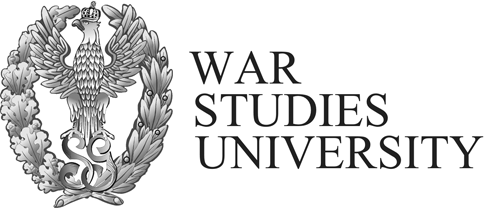Online first
Current issue
All issues
About
Aims and scope
Peer review process
Publication policy and ethics & malpractice statement
Editorial Board
Reviewers
Publisher
Guide for authors
Call for papers
Book Reviews
Special Issues Archive
New and emerging technologies in defence education, training and governance
RESEARCH PAPER
Mediating effect of Indonesia’s public trust on national security from the sense of safety, knowledge, and willingness to participate in state defense efforts
1
Republic of Indonesia Defence University, Faculty of National Security, IPSC Sentul Area, Sukahati, District, Citeureup, Bogor, West Java Province 16810, Indonesia
Submission date: 2021-05-04
Final revision date: 2021-09-21
Acceptance date: 2021-09-28
Online publication date: 2021-11-29
Publication date: 2022-12-30
Corresponding author
Dadang Mas Bakar
Peace and Conflict Resolution, Indonesia Defense University, l. Salemba Raya No.14, RT.3/RW.6, Kenari, Kec. Sen, 10430, Jakarta, Indonesia
Peace and Conflict Resolution, Indonesia Defense University, l. Salemba Raya No.14, RT.3/RW.6, Kenari, Kec. Sen, 10430, Jakarta, Indonesia
Security and Defence Quarterly 2021;36(4):69-88
KEYWORDS
TOPICS
ABSTRACT
Several studies that focus on the willingness to participate show that trust is a vital variable in mediating a person’s disposition to do so. This study examines the role of public trust in national security as a mediating variable of a sense of security and knowledge of the willingness to participate in state defence efforts. The data was collected via a questionnaire distributed to 435 respondents across Indonesia. We used a simple random sampling method; we then analysed using LISREL with Structural Equation Model (SEM). We found that trust cannot mediate a sense of safety and knowledge on the willingness to participate. An exciting finding was that knowledge affects trust, but sense of safety does not affect trust. This is interesting because it contradicts many studies related to political trust, when the willingness to participate is directly influenced by a sense of security and knowledge related to national security. Thus, to increase the willingness to participate in state defence efforts, it is necessary to increase the community’s sense of security and knowledge related to national security. In this case, we recommend providing education related to defence and security to the community and increasing the community’s sense of security.
CONFLICT OF INTEREST
No potential conflict of interest was reported by the authors.
REFERENCES (52)
1.
Adinda J.Q. (2019) ‘Gagasan human security Dalam Kebijakan Personal Security Tinjauan Terhadap draft Rancangan Undang-Undang’, Responsive: Jurnal Pemikiran Dan Penelitian Administrasi, Sosial, Humaniora Dan Kebijakan Publik, 2(1), pp. 8–13. doi: 10.24198/responsive.v2i1.23016.
2.
Akhrani L.A., Imansari F. and Faizah F. (2018) ‘Kepercayaan politik dan partispasi politik pemilih pemula’, Jurnal MediaPsi, 4(1), pp. 1–6. doi: 10.21776/ub.mps.2018.004.01.1.
3.
Alvons M. (2018) ‘Kebebasan Keamanan, Keadilan dan Kedamaian dalam Pemilihan Umum untuk Stabilitas Negara’, Jurnal Legilasi Indonesia, 15(4), pp. 295–307.
4.
Anggraini M., Asrinaldi A. and Zetra A. (2018) ‘Pengaruh kesadaran dan kepercayaan politik terhadap partisipasi politik masyarakat Dharmasraya pada pilkada 2015’, Jurnal Madania, 8(1), pp. 109–132.
5.
Badan Pusat Statistik (2017) Proporsi Penduduk Yang Merasa Aman Berjalan Sendirian Di Area Tempat Tinggalnya 2014–2017. Available at: https://www.bps.go.id/indicator/34/1312/1/proporsi-penduduk-yang-merasa-aman-berjalan-sendirian-di-area-tempat-tinggalnya-.html.
6.
Badan Pusat Statistik (2020) Statistik Indonesia dalam Infografis, Badan Pusat Statistik, Jakarta.
7.
Bakar D.M. (2020) Kepercayaan politik pemuda aktivis dan nonaktivis pada pemerintah, DPRD dan partai politik ditinjau dari motif sosial, Universitas Negeri Makassar.
8.
Baran B.E., Rhoades L. and Miller L.R. (2012) ‘Advancing organizational support theory into the twenty-first century world of work’, Journal of Business and Psychology, 27(2), pp. 123–147. doi: 10.1007/s10869-011-9236-3.
9.
Blind P.K. (2007) ‘Building trust in government in the twenty-first century: Review of literature and emerging issues’, in 7th Global Forum on Reinventing Government, 26-29 June 2006, pp. 1–31.
10.
Bouckaert G. and Van De Walle S. (2014) ‘Government performance and trust in government’, in Paper for the Permanent Study Group on Productivity and Quality in the Public Sector at the EGPA Annual Conference, Vaasa, Finland, 2001: Trust Building Networks–How the government meets citizen in the post-bureaucratic era: Citizen directed government, pp 5-16.
11.
Colquitt J.A., Scott B.A. and LePine J.A. (2007) ‘Trust, trustworthiness, and trust propensity: A meta-analytic test of their unique relationships with risk taking and job performance’, Journal of Applied Psychology, 92(4), pp. 909–927. doi: 10.1037/0021-9010.92.4.909.
12.
Cook K.S. and Santana J.J. (2018) ‘Trust and rational choice’, in E.M Uslaner (ed.), The Oxford Handbook of Social and Political Trust. New York: Oxford University Press, pp. 253–260.
13.
Dermody J., Hanmer-Lloyd S. and Scullion R. (2010) ‘Young people and voting behaviour: Alienated youth and (or) an interested and critical citizenry?’, European Journal of Marketing, 44(3), pp. 421–435. doi: 10.1108/03090561011020507.
14.
Eckstein K., Noack P. and Gniewosz B. (2012) ‘Attitudes toward political engagement and willingness to participate in politics: Trajectories throughout adolescence’, Journal of Adolescence, 35(3), pp. 485–495. doi: 10.1016/j.adolescence.2011.07.002.
15.
Ries E. T., Bersoff M. D., Adkins S., Armstrong C., and Bruening J. (2018) 2018 Edelman Trust Barometer Global Report. New York: Edelman.
16.
Ries E. T., Bersoff M. D., Adkins S., Armstrong C., and Bruening J. (2019) 2019 Edelman Trust Barometer Global Report. New York: Edelman.
17.
Febrieta D. and Pertiwi Y.W. (2018) ‘Rasa aman sebagai prediktor kepercayaan masyarakat dengan hadirnya polisi’, Journal MediaPsi, 4(2), pp. 68–75. doi: 10.21776/ub.mps.2018.004.02.2.
18.
Grimmelikhuijsen S. and Knies E. (2017) ‘Validating a scale for citizen trust in government organizations’, International Review of Administrative Sciences, 83(3), pp. 583–601. doi: 10.1177/0020852315585950.
19.
Guoyu L.I.U. and Chuanlong L.U.O. (2012) ‘Analysis of the safety psychological factors in the coal mine safety management’, Procedia Engineering, 45, pp. 253–258. doi: 10.1016/j.proeng.2012.08.153.
20.
Handaningrum R. and Rini R.A.P. (2014) ‘Persepsi terhadap kualitas calon legislatif (Caleg), dan kepercayaan politik (political trust) dengan partisipasi politik’, Persona:Jurnal Psikologi Indonesia, 3(3), pp. 233–236. doi: 10.30996/persona.v3i03.1578.
21.
Haryadi D., Zafar S.T., Iskandar D., Gustaman F., Sariningsih M and Arraniri I. (2015) Upaya meningkatkan partisipasi politik pemilih melalui kemampuan melek politik (political literacy) pemilih dalam pemilihan umum DPRD Kabupaten Sukabumi. Sukabumi.
22.
Hetherington M.J. (1998) ‘The political relevance of political trust’, American Political Science Review, 92(4), pp. 791–808. doi: 10.2307/2586304.
23.
Hetherington M.J. and Husser J.A. (2012) ‘How trust matters: The changing political relevance of political trust’, American Journal of Political Science, 56(2), pp. 312–325. doi: 10.1111/j.1540-5907.2011.00548.x.
24.
Ilham L. and Pratama M.A. (2016) ‘Hubungan antara tingkat kepercayaan dan kepuasan masyarakat terhadap kinerja anggota DPRD kota Makassar (Studi pada Masyarakat Kecamatan Tamalanrea Kota Makassar)’, Journal Supermasi, 11(2), pp. 193–200.
25.
Indonesia Defence Ministry (2018) ‘Ketahanan nasional dan bela negara’, Special Edition. Wira.
26.
Inoguchi T. and Hotta Z. (2017) ‘Psychometric approach to social capital: Using AsiaBarometer survey data in 29 Asian societies’, in T Inoguchi and Y Tokuda (eds.), Trust with Asian Characteristics: Interpersonal dan Institutional. Singapore: Springer. doi: 10.1007/978-981-10-2305-7_13.
27.
Layard R. et al. (2020) World Happiness Report, Sustainable Development Solution Network, New York.
28.
Leal D.L. and Teigen J.M. (2018) ‘Military service and political participation in the United States: Institutional experience and the vote’, Electoral Studies, 53, pp. 99–110. doi: 10.1016/j.electstud.2017.09.004.
29.
Lewicki R.J. (2006) ‘Trust, trust development, and trust repair’, in Deutsch M., Coleman P.T. and Marcus E.C. (eds.), The Handbook of Conflict Resolution, 2nd ed. Hoboken, NJ: Jossey-Bass/Wiley.
30.
LIPI (2012) ‘LIPI: Cuma 23 persen Rakyat Yang Tertarik Politik’, LIPI, 13 October. Available at: http://lipi.go.id/berita/single/LIPI-Cuma-23-persen-Rakyat-Yang-Tertarik-Politik/6919 (Accessed: 4 April 2021).
31.
Liu G. and Luo C. (2012) ‘Analysis of the safety psychological factors in the coal mine safety management’, Procedia Engineering, 45, pp. 253–258. doi: 10.1016/j.proeng.2012.08.153.
32.
Lu J., Qi L. and Yu X. (2019) ‘Political trust in the internet context: A comparative study in 36 countries’, Government Information Quarterly, 36(4), 101386. doi: 10.1016/j.giq.2019.06.003.
33.
Lühiste K. (2006) ‘Explaining trust in political institutions: Some illustrations from the Baltic states’, Communist and Post-Communist Studies, 39(4), pp. 475–496. doi: 10.1016/j.postcomstud.2006.09.001.
34.
Marien S. and Hooghe M. (2011) ‘Does political trust matter? An empirical investigation into the relation between political trust and support for law compliance’, European Journal of Political Research, 50(2), pp. 267–291. doi: 10.1111/j.1475-6765.2010.01930.x.
35.
Maslow A.H. (1987) Motivation and Personality. New York: Harper & Row, Publishers, Inc.
36.
Merdeka.com (2018) ‘Survei chandra politika: Kepercayaan politik terhadap parpol masih rendah’. Available at: https://www.merdeka.com/politik/survei-charta-politika-kepercayaan-publik-terhadap-parpol-masih-rendah.html (Accessed: 4 April 2021).
37.
Mishler W. and Rose R. (2001) ‘What are the origins of political trust? Testing institutional and cultural theories in post-communist societies’, Comparative and General Pharmacology, 34(1), pp. 30–62. doi: 10.1177/0010414001034001002.
38.
Noordzij K., De Koster W. and Van Der Waal J. (2021) ‘The micro–macro interactive approach to political trust: Quality of representation and substantive representation across Europe’, European Journal of Political Research, 60(1), pp. 1–21. doi: 10.1111/1475-6765.12436.
39.
Organisation for Economic Co-operation and Development (2018) Survey ekonomi OECD Indonesia 2018, OECD Economic Survey. Indonesia OECD 2018. Paris: OECD. doi: 10.1017/CBO9781107415324.004.
41.
Riadi E. (2018) Statistik SEM: Structural Equation Modeling dengan lisrel. Yogyakarta: Penerbit Andi.
42.
Rompf S.A. (2012) Trust and Rationality: An Integrative Framework for Trust Research. Wiesbaden: Springer.
43.
Rudolph T.J. and Evans J. (2005) ‘Political trust, ideology, and public support for Government spending’, Political Trust, Ideology, and Public Support for Government Spending, 49(3), pp. 340–340. doi: 10.5694/j.1326-5377.1972.tb47334.x.
44.
Rungsithong R. and Meyer K.E. (2020) ‘Trust and knowledge sharing in context: A study of international buyer-supplier relationships in Thailand’, Industrial Marketing Management, 88, pp. 112–124. doi: 10.1016/j.indmarman.2020.04.026.
45.
Suprapti K.D. and Nashori F. (2007) ‘Hubungan Antara Kebutuhan Rasa Aman Dengan Partisipasi Politik pada Kader Partai’, Jurnal Indigenous, 9(2), pp. 14–25.
46.
Susanto A.B. (2020) Manajemen Bela Negara: Pendekatan modern menjadi bangsa yang besar. Jakarta: Kompas Media Nusantara.
47.
Tippe S. (2017) Redesain Bela Negara dalam Sistem Pendidikan Nasional. Jakarta: Yayasan Pustaka Obor Indonesia.
48.
Vornanen V. et al. (2018) ‘Mutual trust: Joint performance of an operations strategy implementation – Securing the value chain by preparedness’, in Kozuch B. Magala S.J. and Paliszkiewicz J. (eds.) Managing Public Trust. London: Palgrave Macmillan.
49.
Wahyudi H. et al. (2013) ‘Peran kepercayaan politik dan kepuasan demokrasi terhadap partisipasi politik mahasiswa’, Jurnal Psikologi UIN Sultan Syarif Kasim Riau, 9(2), pp. 94–99.
50.
Wahyudi J., Milla M.N. and Muluk H. (2017) ‘Persepsi keadilan sosial dan kepercayaan interpersonal sebagai prediktor kepercayaan politik pada mahasiswa di Indonesia’, Jurnal Psikologi Sosial, 15(1), pp. 59–71. doi: 10.7454/jps.2017.6.
51.
Wang C.H. (2016) ‘Political trust, civic duty and voter turnout: The mediation argument’, Social Science Journal, 53(3), pp. 291–300. doi: 10.1016/j.soscij.2016.04.008.
52.
World Justice Project (2020) Rule of Law Index 2020, The World Justice Project, World Justice Project. Available at: http://www.oecd.org/mena/governance/45447873.pdf (Accessed: 4 April 2021).
Share
RELATED ARTICLE
We process personal data collected when visiting the website. The function of obtaining information about users and their behavior is carried out by voluntarily entered information in forms and saving cookies in end devices. Data, including cookies, are used to provide services, improve the user experience and to analyze the traffic in accordance with the Privacy policy. Data are also collected and processed by Google Analytics tool (more).
You can change cookies settings in your browser. Restricted use of cookies in the browser configuration may affect some functionalities of the website.
You can change cookies settings in your browser. Restricted use of cookies in the browser configuration may affect some functionalities of the website.




